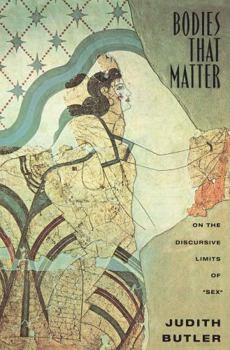Bodies That Matter: On the Discursive Limits of "sex"
Select Format
Select Condition 
Book Overview
In Bodies That Matter, renowned theorist and philosopher Judith Butler argues that theories of gender need to return to the most material dimension of sex and sexuality: the body. Butler offers a... This description may be from another edition of this product.
Format:Paperback
Language:English
ISBN:0415903661
ISBN13:9780415903660
Release Date:September 1993
Publisher:Routledge
Length:304 Pages
Weight:1.07 lbs.
Dimensions:0.8" x 6.0" x 9.0"
Age Range:18 years and up
Grade Range:Postsecondary
Customer Reviews
3 ratings
Material Bodies
Published by Thriftbooks.com User , 15 years ago
With the publication of Gender Trouble in 1990, Judith Butler spearheaded a movement in feminist theory which has become known as 'radical constructivism'. Taking its departures from psychoanalytic and poststructuralist theory, and also informed by speech-act theory, Gender Trouble contends (albeit with sophistication and nuance infinitely greater than this) that gender is not an internal essence, but one produced 'in anticipation' by a repeated and naturalised set of acts, behaviours and stylings. Gender and sexual categories are held in place by the restrictive norms of heterosexuality, but these can be revealed as artificial by their very citability -- as demonstrated in extremis by, for example, drag and camp performance. In Bodies That Matter (1993) Butler extends and complicates the theories put forward in Gender Trouble to contend that not only gender, but the materiality of the body itself, is discursively and performatively produced. We cannot, therefore, speak of a natural, prelinguistic, 'given' body, because what we think we know about bodies is an effect rather than a cause of signification. As with Gender Trouble, this is not to say that bodies are entirely, unchangingly determined by language, but a recognition that, in Butler's words, there can be 'no reference to a pure body which is not at the same time a further formation of that body' (1993, p. 10). Referring to a body is thus, in quite a strict linguistic sense, always almost performative or constitutive, and governed largely (though not entirely) by habitual understandings and norms (such as heterosexism). Again, the citation and iterability of the norms that subjects are expected 'naturally' to embody belies their instability in a classic deconstructive manoeuvre: the natural or intelligible body shores itself up against, and thereby defines or summons the appearance of the deviant or unintelligible (just as the legitimate summons the illegitimate, the authentic the false, the proper the improper, and so forth). The 'performance' of alternative sexualities and gender identities both denaturalises normative suppositions, and pushes for the articulation of new bodily possibilities. Butler outlines her theory of how bodies are produced, or materialised, in discourse, and clarifies the oft-cited notion of performativity in its twinned senses of speech-act and theatrical agency. The textual style in this instance is relatively straightforward by Butler's standards: her work is renowned for what can seem like a wilfully opaque syntax. This, however, is central to her critique, which is shot through with a relentless critical suspicion of the 'common sense' of linguistic transparency.
no better feminist theorist
Published by Thriftbooks.com User , 22 years ago
Butler is one of the most rigourous and thoughtful feminist theorists writing today. In all her writings she follows through the consequences of her arguments with great care, something still lacking in much academic theoretical writing. Especially in writing on the 'body', there is still an awful lot of stuff out there which assumes that bodies are 'things' that speak their own meaning somehow... Butler in this book demonstrates the untenable aspects of that position, and works out brilliantly what some of the consequences are of working thoroughly and rigourously with the idea that the meanings of the body are constructed.
Thought-provoking
Published by Thriftbooks.com User , 25 years ago
This book clarifies much of Foucault was saying in History of Sexuality. Butler is careful, however, to not borrow the models Foucault uses, thereby, avoids some of the mistakes and gaps that occur in his thinking, namely the silence on women. Butler, more than Foucault, is not willing to settle the debate on sexuality merely as the obtaining and disseminating of pleasures and how those bodies perform them. Rather, she takes bodies as always already gender indeterminate and destablilizes their performatives further to show how bodies are marked by gender as well as race, class, sexulaity, etc. and how these categories are also destabilized within the perfomative. I highly recommend this book to feminist and queer theorists and well as anyone who is concerned about creating any sort of opposition to the reactionary right-wing forces that are attempting to further entrench their dominance over the rest of us.





